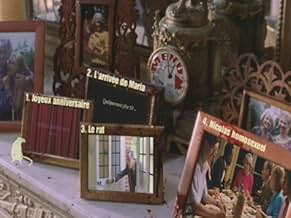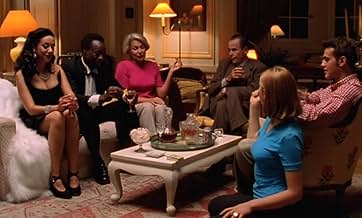NOTE IMDb
6,6/10
5,8 k
MA NOTE
Ajouter une intrigue dans votre langueThe adventures of an upper-class suburban family dealing with their younger brother's homosexuality, elder sister's suicide attempt, masochist tendencies, and a free-spirited maid and her hu... Tout lireThe adventures of an upper-class suburban family dealing with their younger brother's homosexuality, elder sister's suicide attempt, masochist tendencies, and a free-spirited maid and her husband.The adventures of an upper-class suburban family dealing with their younger brother's homosexuality, elder sister's suicide attempt, masochist tendencies, and a free-spirited maid and her husband.
- Réalisation
- Scénario
- Casting principal
- Récompenses
- 3 victoires et 3 nominations au total
Avis à la une
This film is, above all else, a farce. As a farce it works very well and is, in many parts, extremely funny. A regular in Ozon's films, Lucia Sanchez, is excellent as the Spanish maid, and the mother is played to utter perfection by Evelyn Dandry. She is able to portray the utter frustration of any woman with teenage children. Ozon doesn't really cut new ground with this film, with its theme of the disruption of French bourgeois family life, but I don't think that he intends to. The film is funny on its own terms. The notion of Ozon being 'naughty' shines through. Of course, the utter beauty of Stephane Rideau makes the whole thing worthwhile by itself.
An original and inventive black comedy about a bourgeois family thrown into utter chaos, mostly sexual, after the father brings home a lab rat as a pet. Very twisted and bizarre, with many unexpected plot twists, this movie holds the attention to the very end. Ozon gives nods to Bunuel and John Waters without directly copying either. 'Sitcom' will appeal to fans of either of those directors, or to anyone who likes offbeat movies. Highly recommended!
"Sitcom," above all, requires a large grain of salt: it is visually shocking and provocative, and American audiences in particular often dismiss it as a "vulgar" film on these grounds. The plot, however, contains an allegorical richness that is rarely attained in most modern films. It is a theater of the absurd, and must be understood as such in order to comprehend the complexity of meanings and social commentaries it has to offer.
For starters, it is a criticism on the most basic level of the social alienated embodied by bourgeois social standards in France. One of the most accessible aspects of this commentary is the unwillingness of the characters to genuinely communicate to one another. While this makes several scenes totally hilarious, at the same time it micro-cosmically calls into question the validity of a "coherent" unit to address its internal problems; this is, obviously, an allegorical reference to France as a nation. The nation--like this bizarrely self-contained familial unit--is unable to progress and modernize in accordance with modern needs because of a lack of communication. The abstract issues of race, homosexuality, insanity, and even modern psychiatry are called into question. The modern cannot be a museumization of the past, despite whatever aesthetic benefits such staticness might offer.
It would be a good idea before viewing this film to read Freud's "Totem and Taboo." Despite the fact that no scholarly connections between the film and this work in particular have been made, it provides at least some provocative insight into the plot. I would also suggest against making a viewing of this film a family event; it would be most appropriate among those of an older age group, and is a particularly provocative piece of French film.
For starters, it is a criticism on the most basic level of the social alienated embodied by bourgeois social standards in France. One of the most accessible aspects of this commentary is the unwillingness of the characters to genuinely communicate to one another. While this makes several scenes totally hilarious, at the same time it micro-cosmically calls into question the validity of a "coherent" unit to address its internal problems; this is, obviously, an allegorical reference to France as a nation. The nation--like this bizarrely self-contained familial unit--is unable to progress and modernize in accordance with modern needs because of a lack of communication. The abstract issues of race, homosexuality, insanity, and even modern psychiatry are called into question. The modern cannot be a museumization of the past, despite whatever aesthetic benefits such staticness might offer.
It would be a good idea before viewing this film to read Freud's "Totem and Taboo." Despite the fact that no scholarly connections between the film and this work in particular have been made, it provides at least some provocative insight into the plot. I would also suggest against making a viewing of this film a family event; it would be most appropriate among those of an older age group, and is a particularly provocative piece of French film.
This is an odd film about a father who brings a pet rat home to his family, which then sparks off their innermost sexual desires. The son announces he's gay, and ends up with a maid's boyfriend; the daughter jumps out of the window and is paralysed, and then gets her boyfriend to hurt her while she puts cigarettes out on her arm. The wife starts to sleep with the gay son. The daughter asks her father to have sex with her, but he declines, saying she's ugly. The ending is really surreal. Wacky, satirical, perverse & crazy. See it if you can.
François Ozon's pitch black mickey take is a biting satire on family life and a brash distraction from the shows of it's title. While many sitcom's are monotonous affairs, Ozon's take on the medium is anything but. Despite taking in many of the clichés of the sitcom - stuffy mother, raunchy maid, bored father etc - Sitcom manages to be continually inventive and the way that it exposes the clichés of the genre is both ludicrously ridiculous and harshly disturbing. The French director proves with this movie that he's not afraid to overstep several boundaries and make a film that dares to be different, and for that reason this film will never be universally liked. However, if you can connect with Ozon's vision, you're in for a treat and that was the situation I found myself in! The story follows a father who, after bringing his family a lab-rat for a present, finds his family collapsing around him - his son discovers he's gay, his daughter jumps out of the window and his wife...well, I'll leave you to find that out on your own.
Sitcom is a singularly unpleasant experience. Watching family life deteriorate is a much more gruelling affair than you might imagine, and even though the family and the situation that Ozon has presented are utterly ridiculous; he still manages to inject life into it, which ensures that it hammers home the point that the auteur intended. Whenever I see a film that dares to be different and deliver something that I haven't seen before, I tend to find myself heaping the praise on it and that is certainly the case with this film. You will not find a comedy with a more rotten core than this one and similarly you will not find one that dares to present the utterly ridiculous happenings that this movie thrives on. I don't know how Ozon thought he could get away with some of the things in this film - not just the taboo's he's portrayed, but other things too, some of which are just too stupid to comprehend but Ozon makes them work! Sitcom is a movie that needs to be experienced, and it's a film that will divide opinions as much as any other movie ever made. And if only for that reason - see this film as soon as possible.
Sitcom is a singularly unpleasant experience. Watching family life deteriorate is a much more gruelling affair than you might imagine, and even though the family and the situation that Ozon has presented are utterly ridiculous; he still manages to inject life into it, which ensures that it hammers home the point that the auteur intended. Whenever I see a film that dares to be different and deliver something that I haven't seen before, I tend to find myself heaping the praise on it and that is certainly the case with this film. You will not find a comedy with a more rotten core than this one and similarly you will not find one that dares to present the utterly ridiculous happenings that this movie thrives on. I don't know how Ozon thought he could get away with some of the things in this film - not just the taboo's he's portrayed, but other things too, some of which are just too stupid to comprehend but Ozon makes them work! Sitcom is a movie that needs to be experienced, and it's a film that will divide opinions as much as any other movie ever made. And if only for that reason - see this film as soon as possible.
Le saviez-vous
- AnecdotesFrançois Ozon admitted in interviews that his dream cast for the film would have been for Lana Turner to play the daughter and Bette Davis her mother.
- ConnexionsReferenced in 8 femmes (2002)
- Bandes originalesSymphoniie no 1 (Feirlich II)
Music by Gustav Mahler (as G. Mahler)
Meilleurs choix
Connectez-vous pour évaluer et suivre la liste de favoris afin de recevoir des recommandations personnalisées
- How long is Sitcom?Alimenté par Alexa
Détails
Contribuer à cette page
Suggérer une modification ou ajouter du contenu manquant























